2023-2024学年英语鲁教版(五四学制)九年级全一册Unit 5You’re supposed to shake hands 单元复习课件(共23张PPT)
文档属性
| 名称 | 2023-2024学年英语鲁教版(五四学制)九年级全一册Unit 5You’re supposed to shake hands 单元复习课件(共23张PPT) | 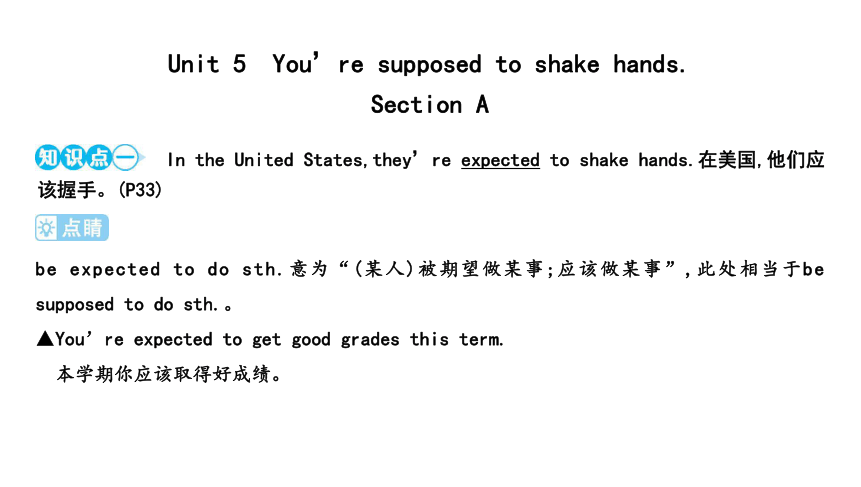 | |
| 格式 | pptx | ||
| 文件大小 | 488.8KB | ||
| 资源类型 | 教案 | ||
| 版本资源 | 鲁教版 | ||
| 科目 | 英语 | ||
| 更新时间 | 2024-07-08 19:47:22 | ||
图片预览


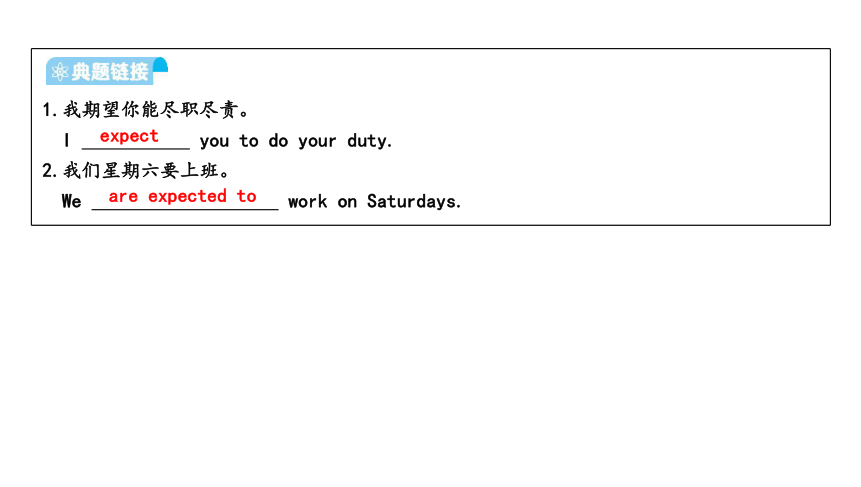
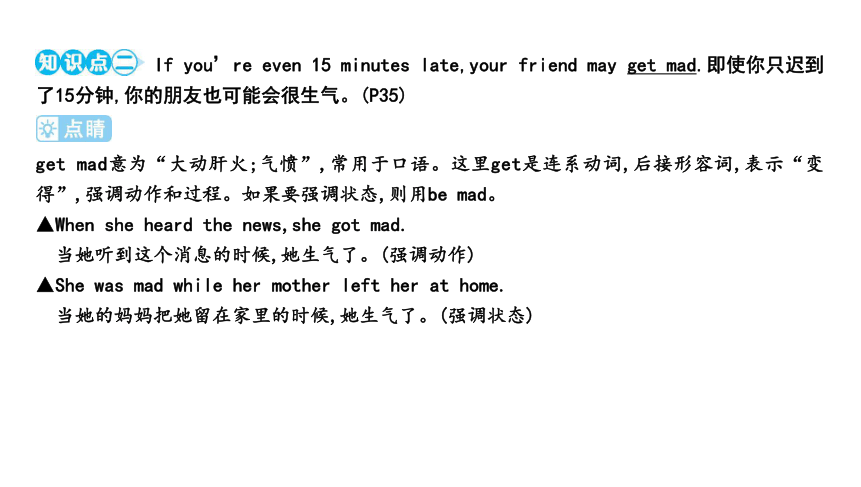
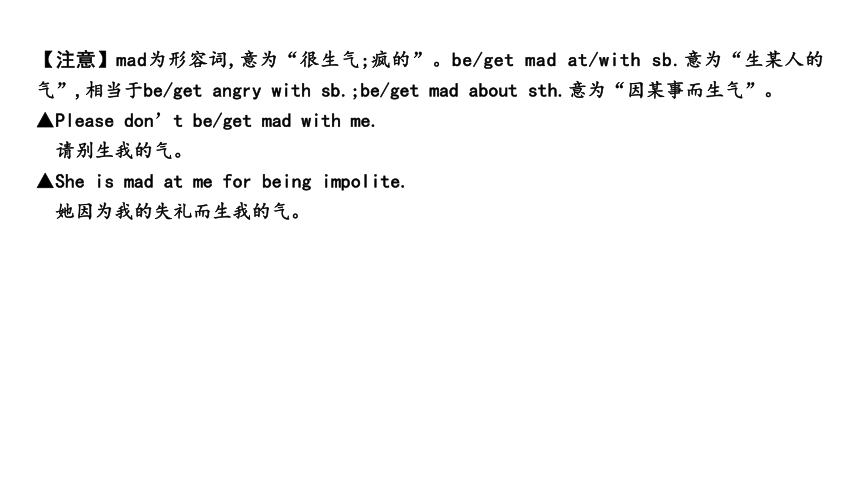
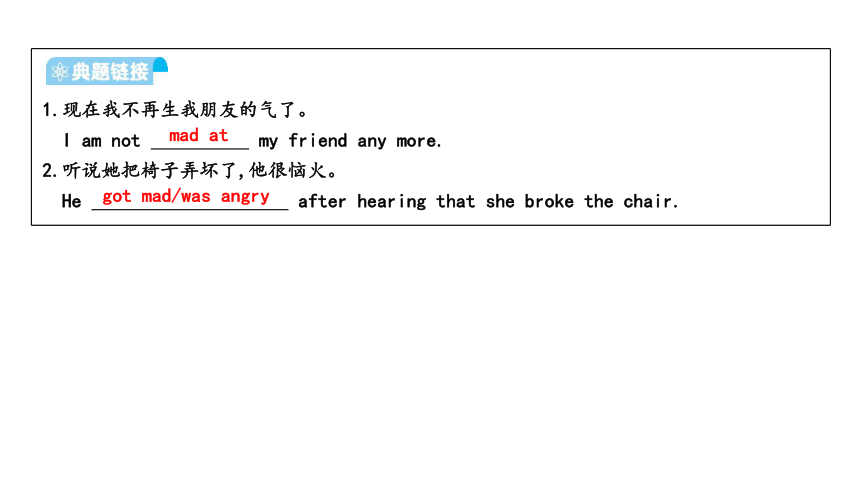
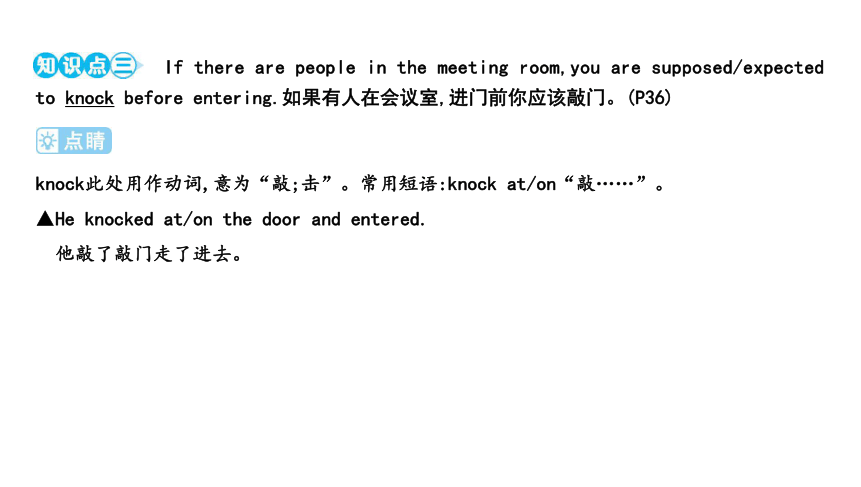
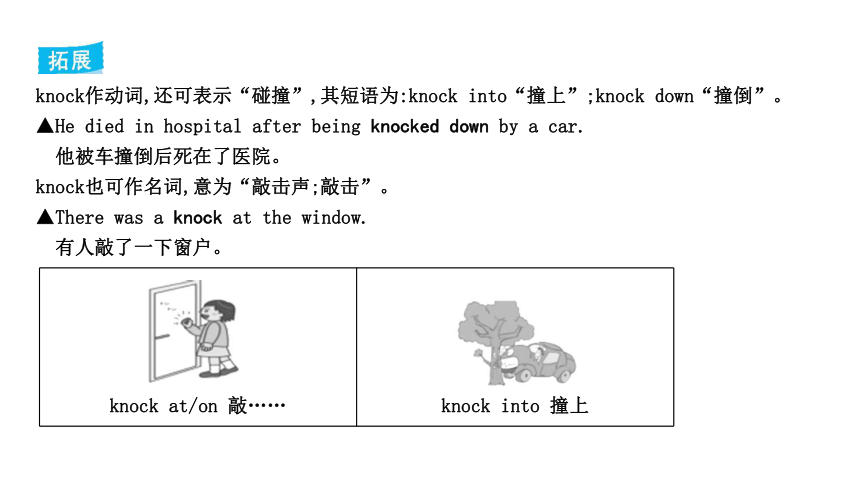
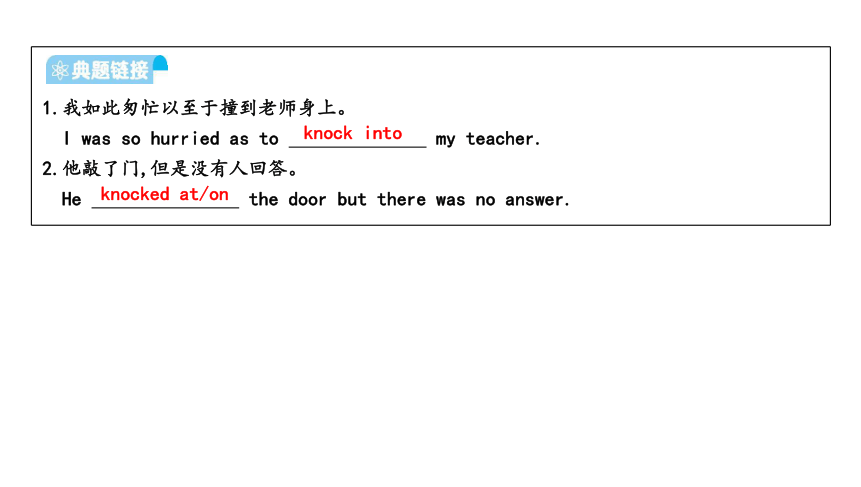
文档简介
(共23张PPT)
Unit 5 You’re supposed to shake hands.
Section A
In the United States,they’re expected to shake hands.在美国,他们应该握手。(P33)
be expected to do sth.意为“(某人)被期望做某事;应该做某事”,此处相当于be supposed to do sth.。
▲You’re expected to get good grades this term.
本学期你应该取得好成绩。
【注意】expect作及物动词,意为“期望;预料;期待”,后可接名词、代词、动词不定式或从句。expect sb.to do sth.意为“期待某人做某事”。
▲I expect a letter from my family.
我期待一封家书。
▲She expects to come back next week.
她预计下个星期回来。
1.我期望你能尽职尽责。
I you to do your duty.
2.我们星期六要上班。
We work on Saturdays.
expect
are expected to
If you’re even 15 minutes late,your friend may get mad.即使你只迟到了15分钟,你的朋友也可能会很生气。(P35)
get mad意为“大动肝火;气愤”,常用于口语。这里get是连系动词,后接形容词,表示“变得”,强调动作和过程。如果要强调状态,则用be mad。
▲When she heard the news,she got mad.
当她听到这个消息的时候,她生气了。(强调动作)
▲She was mad while her mother left her at home.
当她的妈妈把她留在家里的时候,她生气了。(强调状态)
【注意】mad为形容词,意为“很生气;疯的”。be/get mad at/with sb.意为“生某人的气”,相当于be/get angry with sb.;be/get mad about sth.意为“因某事而生气”。
▲Please don’t be/get mad with me.
请别生我的气。
▲She is mad at me for being impolite.
她因为我的失礼而生我的气。
1.现在我不再生我朋友的气了。
I am not my friend any more.
2.听说她把椅子弄坏了,他很恼火。
He after hearing that she broke the chair.
mad at
got mad/was angry
If there are people in the meeting room,you are supposed/expected to knock before entering.如果有人在会议室,进门前你应该敲门。(P36)
knock此处用作动词,意为“敲;击”。常用短语:knock at/on“敲……”。
▲He knocked at/on the door and entered.
他敲了敲门走了进去。
knock作动词,还可表示“碰撞”,其短语为:knock into“撞上”;knock down“撞倒”。
▲He died in hospital after being knocked down by a car.
他被车撞倒后死在了医院。
knock也可作名词,意为“敲击声;敲击”。
▲There was a knock at the window.
有人敲了一下窗户。
knock at/on 敲……
knock into 撞上
1.我如此匆忙以至于撞到老师身上。
I was so hurried as to my teacher.
2.他敲了门,但是没有人回答。
He the door but there was no answer.
knock into
knocked at/on
In many eastern European countries,you are supposed/expected to take off your gloves before shaking hands.在许多东欧国家,握手前你应该摘掉手套。(P36)
take off在此处意为“脱下(衣服)”,为“动词+副词”型短语。其反义词为put on“穿上;戴上”。
▲Take off your coat and sit down.
先脱掉你的外套,然后再坐下。
【注意】take off 还可意为“(飞机等)起飞”。
▲The plane took off at 9:00 a.m.
飞机在上午9点起飞的。
take off 脱掉
take off 起飞
常见的take短语
( )1.—Hurry up!Our plane will soon.
—Don’t worry.We still have enough time.
A.take down B.take off
C.take up D.take after
( )2.You should your shoes before you enter the dancing room.
A.get off B.put off
C.take off D.fall off
B
C
...but it is worth the trouble if you want to understand another culture.……但如果你想了解另一种文化,这麻烦是值得的。(P36)
worth作形容词,意为 “值得;有价值的”。
▲Please tell me how much this painting is worth.
请告诉我这幅画值多少钱。
be worth doing意为“……值得做”。
▲The book is well worth reading.这本书很值得一读。
▲She’s not worth getting angry with.犯不上跟她生气。
【注意】该结构中 worth 后的动名词与句子主语为动宾关系,但该动名词只能用主动形式表示被动意义。
1.The movie is boring,and I think it isn’t worth (wait) for him.
2.这把木椅子价值100元。
The wooden chair 100 yuan.
waiting
is worth
Section B
They go out of their way to make me feel at home.他们尽力使我感到宾至如归。(P38)
go out of one’s way to do sth.相当于make a special effort to do sth.意为“特地(不怕麻烦地)做某事;格外努力地做某事”。
▲He went out of his way to help me.
他特地来帮助我。
▲The shop assistant went out of his way to find what we need.
那个店员不厌其烦地找我们需要的东西。
make sb.feel at home意为“使某人感到宾至如归;无拘无束”。
▲Please sit down and make yourself feel at home.
请坐下,别拘束。
▲Her smile made everyone feel at home.
她的微笑让每个人感到宾至如归。
常见的make短语
1.政府千方百计为无家可归的人提供住房。
The government is going its way to provide houses for the homeless.
2.中国家庭会竭力让你有宾至如归的感觉。
The Chinese family go out of their way to make you .
out of
feel at home
except作介词,意为“除……之外”,后接名词、代词等作宾语,表示把某人或某物排除出某一范围,即不包含在内。
▲All the essays are good except John’s.
除了约翰的,所有的文章都很好。
▲No one trusts him except himself.
除了他自己,没有人相信他。
Another example is that you’re not supposed to eat anything with your hands except bread,not even fruit.另外一个例子是除了面包外,你不应该用手拿任何东西吃,甚至水果也不可以。(P38)
【辨析】
besides 意为“除……之外(还有)”,强调besides后面的内容被包含在内
except 指不包括本身在内的“除……之外(没有)”。不包含 except后面的内容
except for 意为“除……之外”,用于叙述整个情况后,在细节上加以修正或补充,含有惋惜、美中不足之意
【一言辨异】All of them went to the cinema except Tom last time.They all agreed that it was really a wonderful film except for its theme song.This time we’ll all go besides Tom.上次除了汤姆以外他们都去看电影了。大家一致认为除了主题曲之外这部影片真是棒极了。这次除汤姆去以外,我们也都去。
【图解】
besides except except for
1.我们在晚上除了看电视不怎么干别的事。
We don’t do much in the evenings watching television.
2.我除了短袜什么都没穿。
I had nothing on my socks.
3.除足球外你还喜欢哪些运动
What other sports do you like football
4.We work every day except Sunday.
.
except
except for
besides
我们除星期天外每天都工作。
Let me give you some suggestions and advice about Chinese customs.让我给你一些关于中国风俗的建议和意见。(P40)
suggestion用作可数名词,意为“建议”。其动词形式为suggest。 如:
▲His suggestion is that we should learn from her.
他的建议是我们应当向她学习。
▲Could you suggest someone who can give us some suggestions
你能不能推荐一个能给我们一些建议的人
【注意】advice也表示“意见;劝告;建议”,是不可数名词。
▲I can have some free advice for you.
我可为你提供免费咨询。
( )1.Can you give me some ,please
A.message
B.suggestion
C.advice
2.—Do you have any (suggest)
—No,I have no idea.
3.I suggest that we go out to eat.
C
suggestions
我提议我们出去吃吧。
Unit 5 You’re supposed to shake hands.
Section A
In the United States,they’re expected to shake hands.在美国,他们应该握手。(P33)
be expected to do sth.意为“(某人)被期望做某事;应该做某事”,此处相当于be supposed to do sth.。
▲You’re expected to get good grades this term.
本学期你应该取得好成绩。
【注意】expect作及物动词,意为“期望;预料;期待”,后可接名词、代词、动词不定式或从句。expect sb.to do sth.意为“期待某人做某事”。
▲I expect a letter from my family.
我期待一封家书。
▲She expects to come back next week.
她预计下个星期回来。
1.我期望你能尽职尽责。
I you to do your duty.
2.我们星期六要上班。
We work on Saturdays.
expect
are expected to
If you’re even 15 minutes late,your friend may get mad.即使你只迟到了15分钟,你的朋友也可能会很生气。(P35)
get mad意为“大动肝火;气愤”,常用于口语。这里get是连系动词,后接形容词,表示“变得”,强调动作和过程。如果要强调状态,则用be mad。
▲When she heard the news,she got mad.
当她听到这个消息的时候,她生气了。(强调动作)
▲She was mad while her mother left her at home.
当她的妈妈把她留在家里的时候,她生气了。(强调状态)
【注意】mad为形容词,意为“很生气;疯的”。be/get mad at/with sb.意为“生某人的气”,相当于be/get angry with sb.;be/get mad about sth.意为“因某事而生气”。
▲Please don’t be/get mad with me.
请别生我的气。
▲She is mad at me for being impolite.
她因为我的失礼而生我的气。
1.现在我不再生我朋友的气了。
I am not my friend any more.
2.听说她把椅子弄坏了,他很恼火。
He after hearing that she broke the chair.
mad at
got mad/was angry
If there are people in the meeting room,you are supposed/expected to knock before entering.如果有人在会议室,进门前你应该敲门。(P36)
knock此处用作动词,意为“敲;击”。常用短语:knock at/on“敲……”。
▲He knocked at/on the door and entered.
他敲了敲门走了进去。
knock作动词,还可表示“碰撞”,其短语为:knock into“撞上”;knock down“撞倒”。
▲He died in hospital after being knocked down by a car.
他被车撞倒后死在了医院。
knock也可作名词,意为“敲击声;敲击”。
▲There was a knock at the window.
有人敲了一下窗户。
knock at/on 敲……
knock into 撞上
1.我如此匆忙以至于撞到老师身上。
I was so hurried as to my teacher.
2.他敲了门,但是没有人回答。
He the door but there was no answer.
knock into
knocked at/on
In many eastern European countries,you are supposed/expected to take off your gloves before shaking hands.在许多东欧国家,握手前你应该摘掉手套。(P36)
take off在此处意为“脱下(衣服)”,为“动词+副词”型短语。其反义词为put on“穿上;戴上”。
▲Take off your coat and sit down.
先脱掉你的外套,然后再坐下。
【注意】take off 还可意为“(飞机等)起飞”。
▲The plane took off at 9:00 a.m.
飞机在上午9点起飞的。
take off 脱掉
take off 起飞
常见的take短语
( )1.—Hurry up!Our plane will soon.
—Don’t worry.We still have enough time.
A.take down B.take off
C.take up D.take after
( )2.You should your shoes before you enter the dancing room.
A.get off B.put off
C.take off D.fall off
B
C
...but it is worth the trouble if you want to understand another culture.……但如果你想了解另一种文化,这麻烦是值得的。(P36)
worth作形容词,意为 “值得;有价值的”。
▲Please tell me how much this painting is worth.
请告诉我这幅画值多少钱。
be worth doing意为“……值得做”。
▲The book is well worth reading.这本书很值得一读。
▲She’s not worth getting angry with.犯不上跟她生气。
【注意】该结构中 worth 后的动名词与句子主语为动宾关系,但该动名词只能用主动形式表示被动意义。
1.The movie is boring,and I think it isn’t worth (wait) for him.
2.这把木椅子价值100元。
The wooden chair 100 yuan.
waiting
is worth
Section B
They go out of their way to make me feel at home.他们尽力使我感到宾至如归。(P38)
go out of one’s way to do sth.相当于make a special effort to do sth.意为“特地(不怕麻烦地)做某事;格外努力地做某事”。
▲He went out of his way to help me.
他特地来帮助我。
▲The shop assistant went out of his way to find what we need.
那个店员不厌其烦地找我们需要的东西。
make sb.feel at home意为“使某人感到宾至如归;无拘无束”。
▲Please sit down and make yourself feel at home.
请坐下,别拘束。
▲Her smile made everyone feel at home.
她的微笑让每个人感到宾至如归。
常见的make短语
1.政府千方百计为无家可归的人提供住房。
The government is going its way to provide houses for the homeless.
2.中国家庭会竭力让你有宾至如归的感觉。
The Chinese family go out of their way to make you .
out of
feel at home
except作介词,意为“除……之外”,后接名词、代词等作宾语,表示把某人或某物排除出某一范围,即不包含在内。
▲All the essays are good except John’s.
除了约翰的,所有的文章都很好。
▲No one trusts him except himself.
除了他自己,没有人相信他。
Another example is that you’re not supposed to eat anything with your hands except bread,not even fruit.另外一个例子是除了面包外,你不应该用手拿任何东西吃,甚至水果也不可以。(P38)
【辨析】
besides 意为“除……之外(还有)”,强调besides后面的内容被包含在内
except 指不包括本身在内的“除……之外(没有)”。不包含 except后面的内容
except for 意为“除……之外”,用于叙述整个情况后,在细节上加以修正或补充,含有惋惜、美中不足之意
【一言辨异】All of them went to the cinema except Tom last time.They all agreed that it was really a wonderful film except for its theme song.This time we’ll all go besides Tom.上次除了汤姆以外他们都去看电影了。大家一致认为除了主题曲之外这部影片真是棒极了。这次除汤姆去以外,我们也都去。
【图解】
besides except except for
1.我们在晚上除了看电视不怎么干别的事。
We don’t do much in the evenings watching television.
2.我除了短袜什么都没穿。
I had nothing on my socks.
3.除足球外你还喜欢哪些运动
What other sports do you like football
4.We work every day except Sunday.
.
except
except for
besides
我们除星期天外每天都工作。
Let me give you some suggestions and advice about Chinese customs.让我给你一些关于中国风俗的建议和意见。(P40)
suggestion用作可数名词,意为“建议”。其动词形式为suggest。 如:
▲His suggestion is that we should learn from her.
他的建议是我们应当向她学习。
▲Could you suggest someone who can give us some suggestions
你能不能推荐一个能给我们一些建议的人
【注意】advice也表示“意见;劝告;建议”,是不可数名词。
▲I can have some free advice for you.
我可为你提供免费咨询。
( )1.Can you give me some ,please
A.message
B.suggestion
C.advice
2.—Do you have any (suggest)
—No,I have no idea.
3.I suggest that we go out to eat.
C
suggestions
我提议我们出去吃吧。
同课章节目录
- Unit 1 When was it invented?
- Section A
- Section B
- Unit 2 Teenagers should be allowed to choose their
- Section A
- Section B
- Unit 3 It must belong to Carla.
- Section A
- Section B
- Unit 4 I like music that I can dance to.
- Section A
- Section B
- Unit 5 You’re supposed to shake hands.
- Section A
- Section B
- Unit 6 Sad movies make me cry.
- Section A
- Section B
- Unit 7 Life is full of the unexpected.
- Section A
- Section B
- Unit 8 We're trying to save the earth!
- Section A
- Section B
- Unit 9 It's important to have good habits.
- Section A
- Section B
- Unit 10 I remember meeting all of you in Grade 6.
- Section A
- Section B
